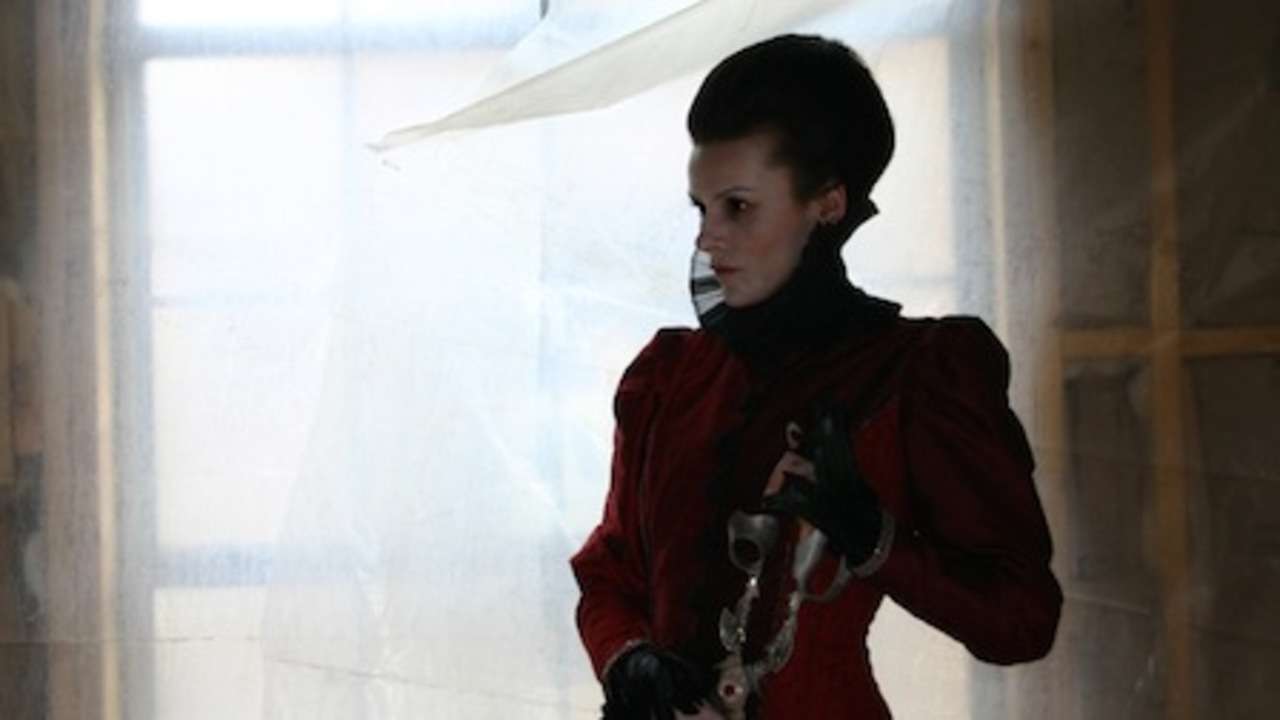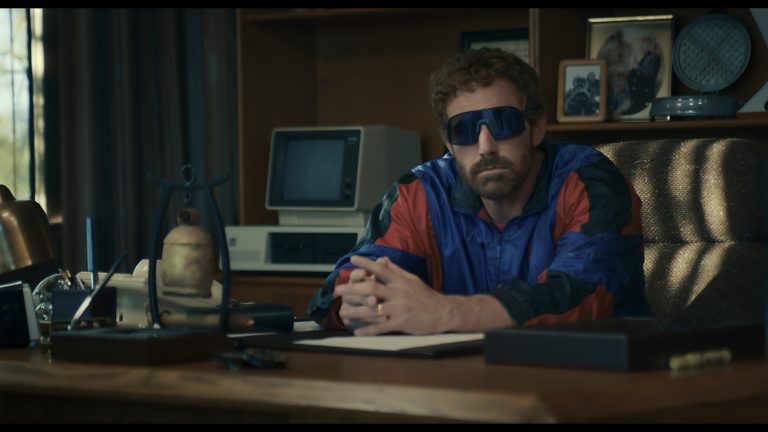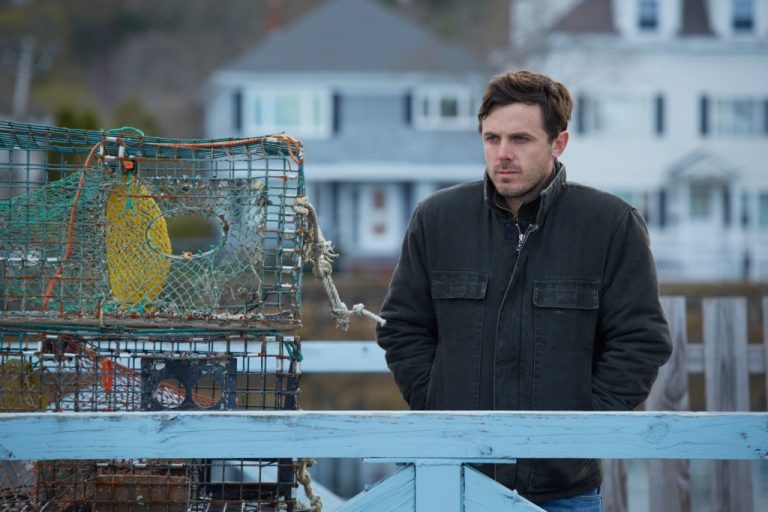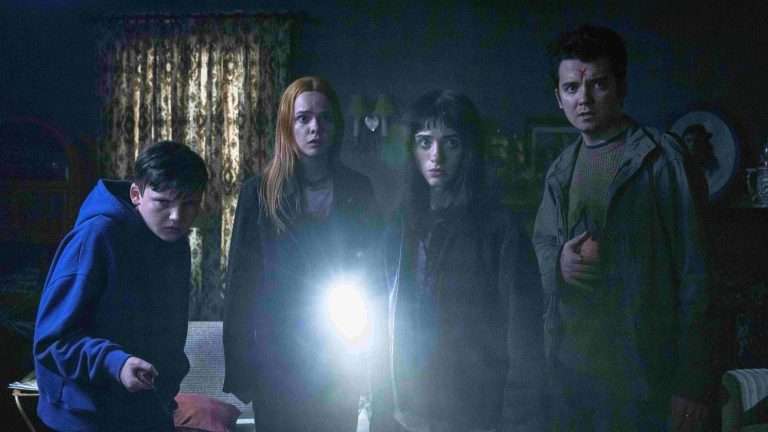It’s always somewhat interesting to dissect a film that was once considered good but developed rust over time. The real challenge, though, is extracting meat from something that’s been bad in thought and form since inception. With the former, there’s at least a pattern to trace—some evolution in us even as the film devolves. But there are more films than one would expect that manage to be timeless in how unserious and awful they are.
William Brent Bell’s “Stay Alive,” a so-called ‘techno-horror’ that’s really just a stockpile of the most dreary and campy supernatural clichés, is a prime specimen. Best remembered as the first release from Hollywood Pictures after a five-year hibernation (a label that quietly died the next year anyway), the film orients itself around the aesthetics and rhythms of the millennial generation. And yet, it captures its prevailing fascinations with such insecurity and unease that the plot’s cracks begin to infest the filmmaking itself, turning it into a crisp mess at best.
Still, despite critical panning and only modest box office returns (earning $27 million against a $20 million budget), the film somehow developed a cult following. It even got an Unrated Director’s Cut, and the director was reportedly planning to assault us with another installment as recently as 2022. The reason is simple: it’s easy-to-digest, toothless, and unintentionally funny “dark” drama, with just enough trauma and guilt sprinkled in to feel like depth. Perfect for the Insta reel age. So, might as well roll in and take notes. Here’s our attempt to break it down.
Stay Alive (2006) Movie Plot Summary and Synopsis:
Before the film flashes its title card, it gives us a little background: Loomis Crawley is playing a video game called Stay Alive, in which his character—and the characters of his roommate Rex and Rex’s girlfriend Sarah—get killed. His friend Hutch was supposed to join them, but couldn’t. After the game finishes late at night, Loomis bumps into his roommate having sex with his girlfriend. He then goes to get water, where he hears some strange sounds. Following them, he runs upstairs and finds Rex and Sarah dead. Loomis dies too, in the exact same way as his character did in the game.
When does Hutch find out about Loomis’ death?
The next day, Hutch goes to his office, where his boss-cum-friend Miller tells him he needs to be as good at clerking to get ahead in life as he is at gaming. It’s then that he receives the call about the deaths of Loomis, Rex, and Sarah. At Loomis’ funeral, he meets Abigail—a friend of Sarah’s—who clicks his picture because she noticed he looked the saddest among the mourners. Hutch also receives some of Loomis’ possessions from his little sister, including Stay Alive. Hutch, his girlfriend, October, and her brother Phineus decide to play the game as a group. Abigail and another friend, Swink, join them, while Hutch’s boss, Miller, plays online from his office.
How does the game begin?

The game is set in a derelict mansion on Gerouge Plantation, but it only starts when the six players recite “The Prayer of Elizabeth,” a request for “all who resist” to perish so that their blood can keep Countess Elizabeth Bathory young. The players fight through a cemetery of evil ghost children, heading toward a mausoleum and tower. The game directs Hutch to pick up a rose. October, a reader of occult literature, explains that undead spirits cannot cross wild roses. Later, separated from the others, Miller throws a rose to dispel the spirits of the undead girls. Since he’s out of roses, a woman in a red dress—the Countess—kills Miller’s character. Minutes later, the Countess appears in Miller’s office and kills him by stabbing him with conjoined scissor blades, like in the game.
What makes the characters realize the game is dangerous?
Two detectives, Thibodeaux and King, question Hutch about the homicide. Hutch realizes Loomis and Miller played Stay Alive right before they died—and that they died the same way their characters did. October researches Bathory and learns she used to drain young women of blood and bathe in it to maintain her youth. Her one weakness was mirrors—she couldn’t stand to see herself aging. Phineus decides to play alone because he thinks Hutch is making things up out of grief, and despite pausing the game before his character dies, he’s killed in real life when a horse-drawn carriage runs him over. The survivors agree to stop playing Stay Alive. However, Detective King ignores Swink’s warning and plays until his character dies, trapped in a chair. King is then killed in his car seat.
Stay Alive (2006) Movie Ending Explained:
Where does the final showdown take place?
Hutch and Abigail search Loomis’ house and track down the game developer’s location, which turns out to be the real Gerouge Plantation. October has discovered that the actual Countess Bathory was locked in the tower of her estate as punishment for her gruesome crimes and vowed to return one day for revenge—something she is now able to do because ‘The Prayer of Elizabeth’ has resurrected her.
The Countess can only be killed by driving three nails into her body to trap her soul. October sees the Countess in real life and tries to kill her, but realizes she’s a ghost. The Countess slits her throat. The three survivors realize that once the game begins, it can keep playing on its own. Swink stays in a van and plays the game on his laptop to distract Bathory, while Hutch and Abigail explore Gerouge Plantation. It becomes clear that they’re in love.
How is the Countess defeated?
The Countess begins cheating, arriving in her carriage to kill Swink in real life, even though his character is still alive. Swink runs but falls into a bush of roses. Hutch and Abigail return to the van and find Swink’s character dead. They take the laptop and some wild roses, which they drop to deter the undead children as they head toward the tower. They become separated, and Hutch decides to perform the ritual on Bathory’s body alone.
Bathory’s phantom attacks Abigail. At the top of the tower, Hutch finds the preserved body of Elizabeth Bathory and hammers three nails into it, after which the spirit disappears. Bathory’s body reanimates. Remembering that the Countess hates mirrors, Hutch uses the reflective laptop to repel her before setting the room ablaze—something he’s afraid of because of a childhood trauma: his mother was burned by her father while sleeping. Swink—still alive thanks to the rose bush—bursts in with Abigail and rescues Hutch.
As Bathory’s body burns, the three leave the tower. Meanwhile, the game store is now selling copies of Stay Alive. Intrigued, a worker puts a copy into a PlayStation 2. As the game’s intro begins, the group reciting Elizabeth Bathory’s prayer is heard as the game zooms in on Bathory, staring out her window.
Stay Alive (2006) Movie Themes Analysed:
Digital Haunting
The themes of “Stay Alive” are so rooted in their time and place that they were bound to age, and they have. It belongs to a moment when the boundary between game and life was being actively questioned, and here, that blur becomes a literal horror device. The characters just stumble upon this game, and shortly after playing it (and losing), they die exactly the way they did in it. How does that happen, especially when the game’s images are pulled from rustic folklore, yet the setting is distinctly cosmopolitan?
How did a medieval Countess suddenly get the brains to develop a 21st-century video game? There are no answers. But that’s the point—it captures a particular techno-paranoia of the post-Y2K era. William Brent Bell emerged as a genre director in this exact period, when cultural anxieties around immersion, addiction, and losing grip on reality were just starting to calcify. The absence of explanation—how a simulation bleeds into perceptive reality—mirrors our delusion of control over what we consume.

The turn of the century lingers in the film’s subtext: old-world folklore gets X-rayed through clunky digital architecture and internet-era animations. But its core critique still reeks of a naggy, traditionalist old man’s sermon. It just keeps hammering the same tired point—escapism is fatal. The game could have been a refuge, a break from the grind of survival or the crushing plainness of existence. Instead, it turns into a trap, as if the only moral left is to go touch grass.
Bloodlines of Misogyny
If “Stay Alive” has any real lore muscle, it comes from the shadow of Countess Elizabeth Bathory—history’s favorite female serial killer from Hungary, turned campy American horror mascot. The film recycles her legend with zero interest in its origins, reducing her into a stock monster who exists to drain virgins and bathe in their blood. It’s Gothic shorthand for evil femininity. And like so many horror films before it, the feminine here is monstrous because it’s powerful.
There’s an old-world misogyny baked into that framework. Bathory isn’t scary because of what she does; she’s scary because she controls the narrative. She kills, therefore she leads. And so the film scrambles to take that control away—to shrink her into a jumpscare mechanic, to contain her inside a game, to ultimately give her no voice beyond the creepy nursery rhyme tone of the game’s voiceover. She’s allowed to exist, but only as a spectacle. Her power is never contextualized, only demonized.
And that’s the thing. Horror has always flirted with the fear of the woman who refuses to obey, who ages without disappearing, who demands blood instead of bleeding quietly. Bathory, as myth and figure, stands at the intersection of that dread. But “Stay Alive” doesn’t explore it; it just decorates itself with it. It borrows the surface-level iconography of feminine rage, but guts it of meaning. There’s no excavation, no cultural residue. Just a vague warning: beware the woman with a history.







